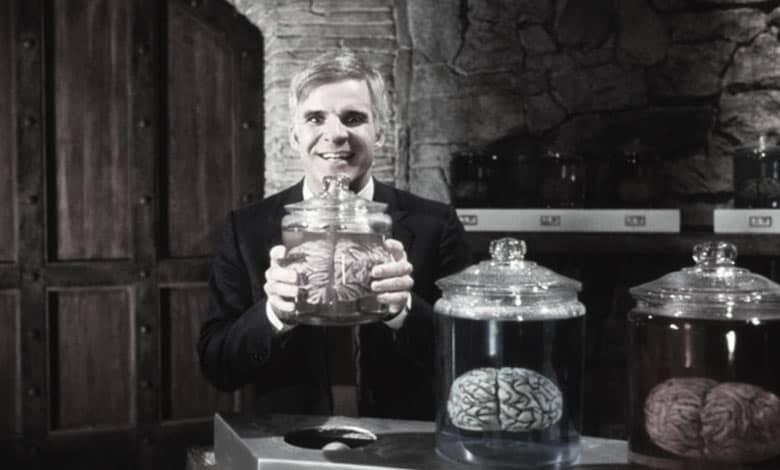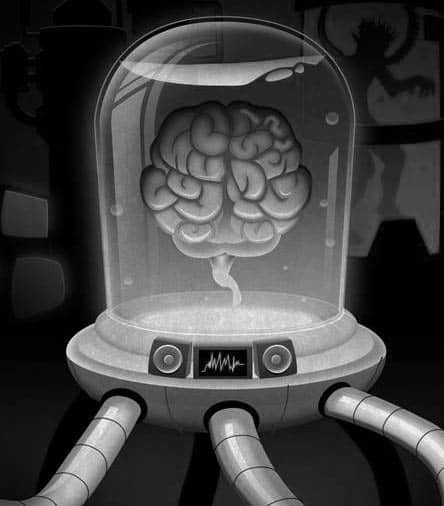
Imagine that you wake up one morning, and there’s absolutely nothing. You can only see a pitch-black void surrounding you. There’s no sound, not even the ringing of silence. You find that you can’t call for help no matter how hard you try to yell. Also, you can’t move or feel your body! What will happen next?
Fortunately, you realize that your brain has been removed from your body, is being kept alive, and can function normally. It is why everything is blank, and you have zero sensory inputs. You can’t feel your body because there’s nobody for you to feel. Moreover, you don’t have the semicircular canals in your ears to tell you how your head is rotated. Unfortunately, this knowledge doesn’t provide any comfort.
You realize that you are helpless and that your existence depends on some unknown person caring for you. But who is taking care of you? Why are they keeping you alive? How did you end up like this? Did an evil scientist steal your brain in the middle of the night? Did you sign up for an experiment and have no memory of it? Where are you? Stay with me to get all these answers.
Can the human brain live without a body? (Brain isolation)
The only thing that can save anything is our brain. What if your brain was kept alive in a jar? Practically, it is impossible to keep the brain alive in a jar because it will lose control of its blood supply. But theoretically, it is possible using mental power and high-tech machine support. When your brain lives in a jar without your body, you wonder about your friends and family. Are they okay? What’s going to happen to you?
So many questions and thoughts run through your head, and it seems you won’t get any answers. No one seems to be trying to contact you. You are wholly trapped inside your mind, surrounded by nothingness. Will you be stuck here for months, years, or the rest of your life?
So how will you keep from going insane? It’s easy for people to go insane in space shuttles or solitary confinement. You are experiencing something much worse. You have no way to interact with the world or people. Do you think there’s any chance that you’ll get out of this situation? Is there any hope that you’ll return to your body and live the life you had before? Here are some facts which help you to understand:
Oxygen and Nutrient Supply: The brain requires a continuous supply of oxygen and nutrients to function, which it receives through the blood. Without the heart to pump blood and the lungs to oxygenate it, the brain would quickly suffer damage and die.
Waste Removal: The body is crucial in removing waste products from the brain. The kidneys, liver, and other organs help filter toxins and waste from the blood. Without these systems, harmful waste products would build up and cause damage.
Hormonal Regulation: The brain communicates with the rest of the body via the hormonal system and the nervous system, both of which regulate numerous critical physiological functions: body temperature, heart rate, and metabolism. Without these regulatory systems, it would be challenging to maintain the optimal conditions required for the brain to function.
Technical Challenges: Even if these issues could be addressed, there would still be immense technical challenges. For example, we currently lack the technology to interface the brain with machines in a way that would allow a disembodied brain to receive sensory input or control a machine or artificial body.
Ethical Considerations: Lastly, even if this were technically possible, there would be significant ethical considerations to address. What would be the quality of life for a disembodied brain? Would it be considered humane to keep a brain alive in this way?
The important thing is that you think intentionally about this and use your imagination in productive ways. Your brain works on a use it or loses it principle. It gets stronger if you use a part of your brain more often.
- If you use a part of it less, it gets weaker.
- If you stop thinking and try to wait for something to happen patiently, then there’s a good chance your brain will turn into mush.
You’re not using it, so you’re going to lose it. So use your imagination and keep your brain moving and alive.

Prison inmates have survived solitary confinement by imagining things for themselves to do in their minds. You could imagine yourself kicking a soccer ball into a wall. Then think about how you kick the ball. How straight was the ball’s path when you kicked it? Where did the ball go after it bounced off the wall? Mental exercises keep parts of your brain working.
If you want to prepare for your brain to be put back into your body and reconnect with the world, you should keep your imagination somewhat grounded in reality. Practice the skills you might need when you return to the world.
Focus primarily on your motor skills and using your five senses. On the other hand, if you choose to accept this as your fate, you may want to create a less realistic reality. Create your own rules and make the most of your situation.
What if a newborn baby’s brain was removed from its body?
If you are isolated and don’t know anything about a particular subject, you have no hope of learning about that subject. If a newborn baby’s brain were removed from its body like this, then this brain would be unable to think. It is because it isn’t in a situation where it needs to learn and change.
This brain can’t learn problem-solving, cause, and effect, how to feel, communicate, or any five senses. It would stay a blank slate because the brain can never develop without learning. This complete isolation, where survival is given without challenge, prevents you from learning new information.
Can you get older if your brain is in complete isolation?
If your brain is put into a jar as a baby, will you become the person you are now? Aren’t your opinions based on your own unique experiences in this world? Haven’t you been at least a little influenced by the people you’ve interacted with? Take all that away. Who are you? Not a painting but a blank canvas. But we’re talking about a situation where you’ve had prior experience.
You may know who you are or have an idea about it. But do you think you can grow in this isolation? Can you become an adult if your brain was removed as a child? If you’re already an adult, could you grow further? I’m not saying it’s impossible to change and grow independently but take it from me.
It usually takes a push to get you in the right direction, and your brain will also be physically changing in this isolation. We already talked about using it or losing it. So, your brain will take away whatever it thinks it doesn’t need and make room for what it thinks it does need.
- Your ability to use all five senses will weaken without naturally using them daily.
Even if you exercise those parts of your brain and imagine the detailed sight, sound, smell, touch, and taste, it will not be as strong as real. Also, the brain will deem those areas less essential, making more room for thinking and imagination. The activities will be primarily doing so with it being difficult to grow and your brain naturally reshaping to adjust to the complete isolation.
Are you still the same person you were before your brain was removed from your body?
That’s more of a personal question. It depends on what you feel is essential to you. If you feel like what you lose is more important than who you are, you may not be the same person. But if you feel like you’re still you, then perhaps that’s true. Now you know how to stay mentally healthy after losing your body. You understand the challenges you’ll face in complete isolation.
We’ve covered the existential dread of your identity being only a brain in a jar. Now you need to ask yourself one question. Do you want to go back? Think about when you’re in a dark room, and the lights suddenly turn on. Your eyes are irritated because they’re not used to the sudden stimuli, the sudden change from complete darkness to bright light.
What about your brain being in complete isolation? (Effect of brain isolation)
You get used to this, and your brain adjusts to this new environment. Let’s say you were given an Android body and suddenly reconnected to the world. Now there are noises everywhere. Bright lights and people surround you. Everything is chaotic. There are sudden stimuli your brain isn’t used to, which could irritate your brain.
- Your brain starts to forget how to see in isolation and is having trouble processing the images you see.
People left in isolation for long periods tend to become more introverted. So, you’ll probably feel at least a little uncomfortable socializing. You need to learn how to communicate and be social with real people. Again, they can be different from the imaginary friends you talk to.
You probably also need physical therapy because your motor skills have decreased. Even if your new Android body is identical to your body before, you still need to relearn the motor skills you started to forget.
Do you think you’d feel comfortable like this? Is this worth being back in the world, or would you prefer being a brain in a jar? Just think about it and let me know your opinion in the comment section.
Read more about the brain:
Can We Upload Our Brain To A Computer?
What Does Dopamine Do For The Brain?
References:
Halbach, “The isolated mammalian brain: an in vivo preparation suitable for pathway tracing.” Eur J Neurosci.
Walkowiak W, Donkelaar HJ, “The use of in vitro preparations of the isolated amphibian central nervous system in neuroanatomy and electrophysiology.”
Holmes R. L., Wolstencroft. “Accessory sources of blood supply to the brain of the cat.”
Sam Boykin. “So you’re dead. now what? Things That Can Happen To Your Body After You’re Gone”. Creative Loafing Atlanta.
Table of Contents
